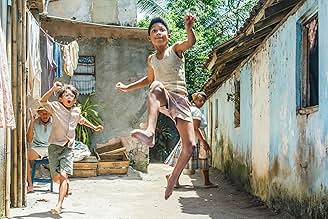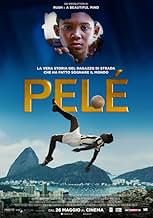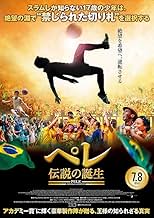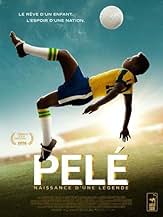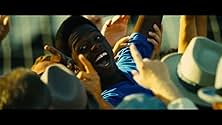CALIFICACIÓN DE IMDb
7.1/10
22 k
TU CALIFICACIÓN
El ascenso meteórico de Pelé desde los barrios marginales de Sao Paulo para llevar a Brasil a su primera victoria en la Copa del Mundo a la edad de 17 años se narra en este drama biográfico.El ascenso meteórico de Pelé desde los barrios marginales de Sao Paulo para llevar a Brasil a su primera victoria en la Copa del Mundo a la edad de 17 años se narra en este drama biográfico.El ascenso meteórico de Pelé desde los barrios marginales de Sao Paulo para llevar a Brasil a su primera victoria en la Copa del Mundo a la edad de 17 años se narra en este drama biográfico.
- Dirección
- Guionistas
- Elenco
Phil Miler
- Narrator
- (voz)
Eric Bell Jr.
- Zoca
- (voz)
- Dirección
- Guionistas
- Todo el elenco y el equipo
- Producción, taquilla y más en IMDbPro
Opiniones destacadas
Pele is one of the most spiritual sports movies I've ever seen and is more heart than anything else.
It's more about the pride of Brazil and Edson Arantes do Nascimento being a beautiful symbol of it.
Pele is a poor kid form a poor part of Brazil who was good enough to use football to start building a better life by being a part of the 1958 Olympic team. More to the story, is that from the place he is from , his father taught him the ginga, for the purpose of the movie, the ginga is a celebration of Brazil's African heritage focus through football, a system that most of Brazil feels lost them the last two Olympic games, but Pele realized they were not doing it right and shows them the path that leads to the gold and Brazilian pride.
The acting itself did not bring on this spirit, but I did like the acting. From the trailer, I was not sure if Vincent D'Onofrio could pull off the role as the team's coach, but indeed he does a find job. It's one of the few sports movies in which the coach's inspiration is a very small part of the movie, but D'Onofrio does well with the little he's got.
The spirit comes more in the film making itself , as they use small special effects like slow motion to make Pele look divine every time he gets the ball, inter cut with scenes of people watching in total ah of what he can do. At first it seems cheesy when they first start doing it, but after a while it gets into a rhythm that gets you into it, and you can't help but to let it touch your soul.
I don't think it's better or worse than any other sports movie. What makes it unique is that they're are very few of these about Soccer (and so many about American Football), but it does the trick of inspiring you and having you cheer for the underdog, though I feel I did not really learn much about Pele in the process.
It's more about the pride of Brazil and Edson Arantes do Nascimento being a beautiful symbol of it.
Pele is a poor kid form a poor part of Brazil who was good enough to use football to start building a better life by being a part of the 1958 Olympic team. More to the story, is that from the place he is from , his father taught him the ginga, for the purpose of the movie, the ginga is a celebration of Brazil's African heritage focus through football, a system that most of Brazil feels lost them the last two Olympic games, but Pele realized they were not doing it right and shows them the path that leads to the gold and Brazilian pride.
The acting itself did not bring on this spirit, but I did like the acting. From the trailer, I was not sure if Vincent D'Onofrio could pull off the role as the team's coach, but indeed he does a find job. It's one of the few sports movies in which the coach's inspiration is a very small part of the movie, but D'Onofrio does well with the little he's got.
The spirit comes more in the film making itself , as they use small special effects like slow motion to make Pele look divine every time he gets the ball, inter cut with scenes of people watching in total ah of what he can do. At first it seems cheesy when they first start doing it, but after a while it gets into a rhythm that gets you into it, and you can't help but to let it touch your soul.
I don't think it's better or worse than any other sports movie. What makes it unique is that they're are very few of these about Soccer (and so many about American Football), but it does the trick of inspiring you and having you cheer for the underdog, though I feel I did not really learn much about Pele in the process.
I was invited to the world premier of this film at the TriBeCa Film Festival, in New York. I say invited, as if my life is some sort of glamorous affair. In reality, a mate at work couldn't make it, and he knew I'd have no actual plans, so I eagerly obliged.
Just before the movie started, the 350 or so people in the audience got what they wanted, as the man himself stood up and raised his hand to the instagram happy crowd. Just knowing Pele was in the audience gave the room a little extra energy.
Perhaps a little naive, I knew a little about Pele's playing career but little of the man and, the journey to what he became. The film follows his early years with friends at home, up until he becomes 17 and plays for Brazil in the 1958 World Cup in Sweden. There's enough humour, big laughs, drama, and passion in the film that will translate to fans familiar with the legend and those who may have only heard of him.
The real treat, were the applause, and cheering from the audience when the on-screen Pele scored. His hand went up in recognition and the cheers got louder. I was pleased that despite the film keeping my attention he may have nodded off, he's knocking on a bit.
I waited outside afterward and managed to get a signed Santos shirt from him, which kinda gave me goose pimples, and rammed home the magnitude of who this man was, and what he had done for the game. My dad would have been proud. Sadly the shirt is the guys from work, so I'm currently deciding whether to buy a replica shirt and say I didn't get it, or beginning to practice the man's signature! That's okay, isn't it...
I did snap a selfie. Insta - Jamesbydesign
Just before the movie started, the 350 or so people in the audience got what they wanted, as the man himself stood up and raised his hand to the instagram happy crowd. Just knowing Pele was in the audience gave the room a little extra energy.
Perhaps a little naive, I knew a little about Pele's playing career but little of the man and, the journey to what he became. The film follows his early years with friends at home, up until he becomes 17 and plays for Brazil in the 1958 World Cup in Sweden. There's enough humour, big laughs, drama, and passion in the film that will translate to fans familiar with the legend and those who may have only heard of him.
The real treat, were the applause, and cheering from the audience when the on-screen Pele scored. His hand went up in recognition and the cheers got louder. I was pleased that despite the film keeping my attention he may have nodded off, he's knocking on a bit.
I waited outside afterward and managed to get a signed Santos shirt from him, which kinda gave me goose pimples, and rammed home the magnitude of who this man was, and what he had done for the game. My dad would have been proud. Sadly the shirt is the guys from work, so I'm currently deciding whether to buy a replica shirt and say I didn't get it, or beginning to practice the man's signature! That's okay, isn't it...
I did snap a selfie. Insta - Jamesbydesign
PELE is probably the biggest name in the soccer history that has shaped & shifted the current playing style of modern day game. The extravagant career speaks for itself. The movie shows us the making & coming to be of PELE.
I see a lot pf people saying this movie is predictable, not so good & what not. to all of them & most importantly to all of u i say, this movie is more than just a football movie. Not every movie is supposed to be a thriller or an Avenger movie. simple things in life have a way of getting to us.
This movie is about small & humble beginnings, its about friendship , its about believing in one self, taking the risk. Movie shows us that is does not matter if u have all the resources or opportunities in the world. if u keep at it, if u find something that you are passionate about & stick to it, day by day, night after night, the results speak for itself.
Movie has amazing moments, really great camera work. one of the best for all the soccer movies out there. Even if one know nothing about the legend that PELE is, once you are into the movie, you cant resist to feel the journey he is going to make in life. I was finding myself constantly tears of joy rolling down my cheek coz i was hooked into the movie. had soo many of those watering your eyes moments that once the movie was over, i was filled with joy and happiness to have witness such a good work of art.
Acting & direction is simple & stunning. camera-work is amazing , specially in those moments you want to fell the greatness of the legend, the movie gives you that.
I'll keep going back to watching this movie , just to feel that joy of watching something beautiful in the making again & again.
I see a lot pf people saying this movie is predictable, not so good & what not. to all of them & most importantly to all of u i say, this movie is more than just a football movie. Not every movie is supposed to be a thriller or an Avenger movie. simple things in life have a way of getting to us.
This movie is about small & humble beginnings, its about friendship , its about believing in one self, taking the risk. Movie shows us that is does not matter if u have all the resources or opportunities in the world. if u keep at it, if u find something that you are passionate about & stick to it, day by day, night after night, the results speak for itself.
Movie has amazing moments, really great camera work. one of the best for all the soccer movies out there. Even if one know nothing about the legend that PELE is, once you are into the movie, you cant resist to feel the journey he is going to make in life. I was finding myself constantly tears of joy rolling down my cheek coz i was hooked into the movie. had soo many of those watering your eyes moments that once the movie was over, i was filled with joy and happiness to have witness such a good work of art.
Acting & direction is simple & stunning. camera-work is amazing , specially in those moments you want to fell the greatness of the legend, the movie gives you that.
I'll keep going back to watching this movie , just to feel that joy of watching something beautiful in the making again & again.
Brazilian teams play a style of soccer all their own. (Yeah, I called it soccer. Gimmie a break. I'm an American.) They call that style "ginga". It's a very fluid kind of play that emphasizes creative ball control. Some call this style of play "flamboyant". Others dismiss it as "trick plays". Brazilians simply think of it as
their heritage. The Urban Dictionary's definition of ginga states, in part, "Ginga is creativity... the opposite of mechanical soccer. It is having fun with the ball. It is grace. It is being fluid and coordinated. IT IS SOUL. IT IS DANCE." A June 15, 2014 "New York Times" article explains the development of ginga this way: "
an imaginative style of play that made competition and gratifying playfulness inseparable, with blacks and people of mixed race rising from exclusion and becoming its main protagonists." Ginga is a unique mixing of the skills of samba dancers with Brazilian martial arts fighters, all applied to the game of soccer, turning it into, as the Brazilians call it, "the beautiful game", while also celebrating Brazil's different races and cultures. The focus on ginga in the biopic "Pelé: Birth of a Legend" (PG, 1:47) educates its audience, celebrates that style of soccer and captivates Movie Fans with the true rags-to-riches story of the greatest soccer player ever, a man known all around the world simply as
Pelé.
As the film opens, the nearly 10-year-old Pelé (born Edson Arantes do Nascimento, and called "Dico" by his family and friends) is watching a television broadcast as his native Brazil loses the 1950 World Cup to Uruguay. Brazil's loss was a huge upset, a phrase which also describes the emotions of Brazil's soccer fans (which was basically everybody). The entire country was shocked, humiliated and demoralized. Dico (Leonardo Lima Carvalho) promises his father, a former soccer player known as Dondinho (played by Brazilian musician/actor Seu Jorge), that he, Dico, will one day bring Brazil a World Cup Championship.
Dico's family is so poor that Dico doesn't even own a soccer ball – or even a pair of shoes, but the kid manages to develop his natural talent anyway. Under his father's tutelage, he learns ball-handling by juggling and kicking grapefruits and he plays on a local team with his friends. Their team is literally called "The Shoeless Ones" and is mercilessly mocked by the town's rich kids, who single out Dico for a special measure of abuse and start calling him "Pelé". It's a made-up name which is meant to be an insult, and Dico hates the name, but as he works through his anger by helping his team play better than expected on the soccer field, the name sticks, and "Pelé" becomes synonymous with Dico and his amazing talent.
Continuing to hone his skills on his own time and play brilliantly on the field in spite of having to endure prejudice and personal tragedy, Pelé (played as a teenager by Kevin de Paula) is recruited and mentored by former player Waldemar De Brito (Milton Gonçalves). Pelé's talent gets him a spot on a professional soccer club, Santos FC, and then on Brazil's national team, all before he reached the age of 17. On the national team, Pelé's coach is Vicente Feola (Vincent D'Onofrio), the latest in a series of coaches who tries to beat Pelé's individuality out of him and force him to play a more traditional and "sophisticated" European style. Many Brazilians blamed the ginga style of play for the 1950 World Cup loss, but ginga is Pelé's strength. Pelé finds himself struggling with his coach's instruction, and an old adversary turned teammate, plus a significant knee injury, all while the national team prepares for the 1958 World Cup tournament and a possible championship matchup against the heavily-favored team representing the host country of Sweden, coached by the arrogant and condescending George Raynor (Colm Meaney).
"Pelé: Birth of a Legend" represents formulaic and unrefined filmmaking, but still manages to inspire on multiple levels. Co-written and co-directed by brothers Jeff and Michael Zimbalist (both working on their first feature film), the movie follows the tried-and-true pattern of most sports movies, but suffers from some minor issues of technique. The script sometimes stops short of completing its thoughts and the film is a bit over-edited, making the viewer feel like something is missing in a few of the scenes. Some characters are underdeveloped and some of the acting is shaky, but the main characters (especially D'Onofrio, Jorge and de Paula) all give strong performances. The film spends too much time on Pelé's childhood and not enough time on his rise through the ranks of Brazilian soccer, but does convey why Pelé was so good and wisely culminates with the '58 World Cup, at which point it's clear that all the pieces are finally in place for Pelé's eventual worldwide fame and unparalleled success. In spite of the film's lack of originality and other relatively minor problems, the Zimbalist brothers and their cast and crew give us plenty to shout about during the film's third act and leaves us with important lessons about determination, resilience and playing to our strengths, as well as the importance and strength of diversity. As much as I enjoyed "Pelé: Birth of a Legend" (especially its emotional ending), after fairly weighing all of its strengths and weaknesses, the most I can give it is a mild recommendation: "B"
As the film opens, the nearly 10-year-old Pelé (born Edson Arantes do Nascimento, and called "Dico" by his family and friends) is watching a television broadcast as his native Brazil loses the 1950 World Cup to Uruguay. Brazil's loss was a huge upset, a phrase which also describes the emotions of Brazil's soccer fans (which was basically everybody). The entire country was shocked, humiliated and demoralized. Dico (Leonardo Lima Carvalho) promises his father, a former soccer player known as Dondinho (played by Brazilian musician/actor Seu Jorge), that he, Dico, will one day bring Brazil a World Cup Championship.
Dico's family is so poor that Dico doesn't even own a soccer ball – or even a pair of shoes, but the kid manages to develop his natural talent anyway. Under his father's tutelage, he learns ball-handling by juggling and kicking grapefruits and he plays on a local team with his friends. Their team is literally called "The Shoeless Ones" and is mercilessly mocked by the town's rich kids, who single out Dico for a special measure of abuse and start calling him "Pelé". It's a made-up name which is meant to be an insult, and Dico hates the name, but as he works through his anger by helping his team play better than expected on the soccer field, the name sticks, and "Pelé" becomes synonymous with Dico and his amazing talent.
Continuing to hone his skills on his own time and play brilliantly on the field in spite of having to endure prejudice and personal tragedy, Pelé (played as a teenager by Kevin de Paula) is recruited and mentored by former player Waldemar De Brito (Milton Gonçalves). Pelé's talent gets him a spot on a professional soccer club, Santos FC, and then on Brazil's national team, all before he reached the age of 17. On the national team, Pelé's coach is Vicente Feola (Vincent D'Onofrio), the latest in a series of coaches who tries to beat Pelé's individuality out of him and force him to play a more traditional and "sophisticated" European style. Many Brazilians blamed the ginga style of play for the 1950 World Cup loss, but ginga is Pelé's strength. Pelé finds himself struggling with his coach's instruction, and an old adversary turned teammate, plus a significant knee injury, all while the national team prepares for the 1958 World Cup tournament and a possible championship matchup against the heavily-favored team representing the host country of Sweden, coached by the arrogant and condescending George Raynor (Colm Meaney).
"Pelé: Birth of a Legend" represents formulaic and unrefined filmmaking, but still manages to inspire on multiple levels. Co-written and co-directed by brothers Jeff and Michael Zimbalist (both working on their first feature film), the movie follows the tried-and-true pattern of most sports movies, but suffers from some minor issues of technique. The script sometimes stops short of completing its thoughts and the film is a bit over-edited, making the viewer feel like something is missing in a few of the scenes. Some characters are underdeveloped and some of the acting is shaky, but the main characters (especially D'Onofrio, Jorge and de Paula) all give strong performances. The film spends too much time on Pelé's childhood and not enough time on his rise through the ranks of Brazilian soccer, but does convey why Pelé was so good and wisely culminates with the '58 World Cup, at which point it's clear that all the pieces are finally in place for Pelé's eventual worldwide fame and unparalleled success. In spite of the film's lack of originality and other relatively minor problems, the Zimbalist brothers and their cast and crew give us plenty to shout about during the film's third act and leaves us with important lessons about determination, resilience and playing to our strengths, as well as the importance and strength of diversity. As much as I enjoyed "Pelé: Birth of a Legend" (especially its emotional ending), after fairly weighing all of its strengths and weaknesses, the most I can give it is a mild recommendation: "B"
I want to state first that I do really like Pélé, he is one of the best athletes in history, not only in his athletic performance but also in his conduct outside the pitch.
His compelling personality is well displayed and I cannot speak with certainty about his background, but I suspect that while it was challenging it was perhaps not quite as bad as it is displayed at times.
My main problem with the movie is the display of the national teams aside from the brazilians. It was at this time and unlike the depiction of the movie well known that Brazil was a good team, perhaps not the favorites to win, but by no means a complete underdog. The favorites to win were West Germany, France and the Soviet Union. Sweden who is antagonisticly depicted was a nation with many players at the very end of their career and though the population was excited at their nations participation and that for the first time (for the swedes) professional players playing in clubs abroad would be permitted to play for the national team. So people were hopeful that with homefield advantage and the addition of a handful of worldclass professionals though perhaps past their prime(Niels Liedholm 36 at the time and Gunnar Gren 38) that maybe possibly Sweden could win.
So the primary factual error here is that Brazil was by no means colossal underdogs and the Swedes were not as massively favored as depicted and certainly not as arrogant and demeaning as they are shown. Though there is some truth in their strategy in the final game, the swedes did hope to try and score an early goal hoping the brazilians would be unable to recover.(According to Niels Liedholm).
I also find it unfortunate that while racism is horrible and was certainly present even amongst my own swedish ancestors. It is very unfortunate that this media never depicted some of the really inspiring moments of people in this tournament. Because in the end Pélé have stated that the swedish king at the time went down to meet the players on both sides and shook everybodys hand and chatted with them regardless of what they looked like. For many people just like the king football have no color and whilst Péle has had to deal with his fair share of racism he has seldom dwelt on the negative, but almost always uplifted the positive.
For my parents who vividly remember this tournament and who have always held Pélé in very high regard as both a footballer and a person. It was rather difficult to swallow the depiction of his opponents(our national team in particular) and that of the tournament as a whole which is perhaps one of the most memorable world cups in history with Pélé the 17-year old wunderkind and Just Fontaine who set a record of scoring goals that to this day stands.
His compelling personality is well displayed and I cannot speak with certainty about his background, but I suspect that while it was challenging it was perhaps not quite as bad as it is displayed at times.
My main problem with the movie is the display of the national teams aside from the brazilians. It was at this time and unlike the depiction of the movie well known that Brazil was a good team, perhaps not the favorites to win, but by no means a complete underdog. The favorites to win were West Germany, France and the Soviet Union. Sweden who is antagonisticly depicted was a nation with many players at the very end of their career and though the population was excited at their nations participation and that for the first time (for the swedes) professional players playing in clubs abroad would be permitted to play for the national team. So people were hopeful that with homefield advantage and the addition of a handful of worldclass professionals though perhaps past their prime(Niels Liedholm 36 at the time and Gunnar Gren 38) that maybe possibly Sweden could win.
So the primary factual error here is that Brazil was by no means colossal underdogs and the Swedes were not as massively favored as depicted and certainly not as arrogant and demeaning as they are shown. Though there is some truth in their strategy in the final game, the swedes did hope to try and score an early goal hoping the brazilians would be unable to recover.(According to Niels Liedholm).
I also find it unfortunate that while racism is horrible and was certainly present even amongst my own swedish ancestors. It is very unfortunate that this media never depicted some of the really inspiring moments of people in this tournament. Because in the end Pélé have stated that the swedish king at the time went down to meet the players on both sides and shook everybodys hand and chatted with them regardless of what they looked like. For many people just like the king football have no color and whilst Péle has had to deal with his fair share of racism he has seldom dwelt on the negative, but almost always uplifted the positive.
For my parents who vividly remember this tournament and who have always held Pélé in very high regard as both a footballer and a person. It was rather difficult to swallow the depiction of his opponents(our national team in particular) and that of the tournament as a whole which is perhaps one of the most memorable world cups in history with Pélé the 17-year old wunderkind and Just Fontaine who set a record of scoring goals that to this day stands.
¿Sabías que…?
- TriviaThe Old Guy in suit who's tea was dropped by the Brazilian team at the hotel before the Final of 1958 World cup was actually the real Pele as himself.
- ErroresIn the film, Pelè's mother is a servant in Josè Altafini "Mazzola's" home. In real life, both Pelè and Altafini were from modest families. They also lived in different towns.
- Créditos curiososThe end credits include the disclaimer that "The persons and events in this motion picture are fictitious. Any similarity to actual persons or events is unintentional." Which is of course ridiculous considering this is a biopic of Pelé loaded with real events (like the 1958 world cup).
- ConexionesFeatures 1958 FIFA World Cup (1958)
Selecciones populares
Inicia sesión para calificar y agrega a la lista de videos para obtener recomendaciones personalizadas
- How long is Pele: Birth of a Legend?Con tecnología de Alexa
Detalles
- Fecha de lanzamiento
- País de origen
- Sitio oficial
- Idiomas
- También se conoce como
- Pele: Birth of a Legend
- Locaciones de filmación
- Productoras
- Ver más créditos de la compañía en IMDbPro
Taquilla
- Total en EE. UU. y Canadá
- USD 57,046
- Fin de semana de estreno en EE. UU. y Canadá
- USD 7,226
- 15 may 2016
- Total a nivel mundial
- USD 7,846,608
- Tiempo de ejecución1 hora 47 minutos
- Color
- Relación de aspecto
- 2.35 : 1
Contribuir a esta página
Sugiere una edición o agrega el contenido que falta

Principales brechas de datos
What is the French language plot outline for Pelé: la película (2016)?
Responda


